|
|
|
Sort Order |
|
|
|
Items / Page
|
|
|
|
|
|
|
| Srl | Item |
| 1 |
ID:
131095
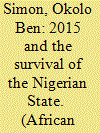

|
|
|
|
|
| Publication |
2014.
|
| Summary/Abstract |
Nigeria is currently faced with serious domestic challenges. While the state is not officially at war, it is standing on the precipice, especially with the eruption of violence occasioned by the emergence of the Boko Haram sect and the tenuous peace in the Niger Delta. With the 2015 general elections on the horizon, fears of further violence and disintegration are rife, more so because of the debate over who occupies the Presidential Villa at Abuja. President Goodluck Jonathan, a southerner, seems poised for a comeback even amidst the vociferous challenge posed by the political elites of northern Nigeria. This article looks at the different scenarios that might play out in 2015. It analyses the challenges of the survival of the Nigerian state, and makes some policy recommendations that Nigeria and its people need to put into place in order to ensure its survival beyond 2015.
|
|
|
|
|
|
|
|
|
|
|
|
|
|
|
|
| 2 |
ID:
131096
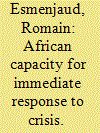

|
|
|
|
|
| Publication |
2014.
|
| Summary/Abstract |
The creation of an African Capacity for Immediate Response to Crisis (ACIRC) is a sign of Africa's willingness to take its destiny into its own hands. Presented as a reaction to the slowness of the development of the African Standby Force (ASF), it is also a response to some of the ASF's conceptual weaknesses. This decision reflects a wish to establish an instrument better equipped to deal with the challenges Africa is facing. Departing from the (sub)regional logic of the ASF results from a desire to take into account the transnational nature of threats, while its enlarged mandate is meant to offer Africa the capacity to intervene in all kinds of conflicts, including by undertaking peace enforcement activities. But the obstacles on the road towards the actual creation and mobilisation of this capacity should not be underestimated. These include material difficulties, but also political tensions, between 'small' and 'big' states as well as between the African Union and subregional organisations. The risk then is high that the ACIRC, whose announcement came as a reaction to France's intervention in Mali, ends up joining the ranks of the many 'anti-imperialist' phantoms haunting the history of the Organization of African Unity/African Union (OAU/AU). Confronted by events considered 'neocolonial' initiatives, African actors have indeed traditionally reacted by launching grand projects that never got off the ground. However, by actually establishing this new instrument, they may also demonstrate that times have definitively changed.
|
|
|
|
|
|
|
|
|
|
|
|
|
|
|
|
| 3 |
ID:
131097


|
|
|
|
|
| Publication |
2014.
|
| Summary/Abstract |
This commentary analyses the international response to the crisis that struck the Central African Republic (CAR) in early December 2013. It examines three intertwined dimensions defining the courses of action available to policymakers dealing with pre-genocidal crises: the politics and institutional manoeuvring shaping the United Nations (UN) Security Council's decision to authorise an enforcement mission without deploying 'blue helmets' on the ground; the operational complexities involved in launching rapid reaction forces; and the interdependent logics between peacebuilding and atrocity prevention. The author argues that there are three ways for the UN Secretariat to ensure a more effective response to CAR-type situations: generating political will to respond swiftly to deteriorating crises leading to widespread abuses of human rights by advancing the concept of Responsibility to Protect as a core component of states' national interests; developing strategic frameworks for the deployment of multi-plural missions equipped to avert the actual or potential threat of atrocities; and developing joint early warning and scenario planning between peacebuilding and atrocity prevention agencies.
|
|
|
|
|
|
|
|
|
|
|
|
|
|
|
|
| 4 |
ID:
131091
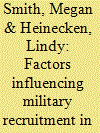

|
|
|
|
|
| Publication |
2014.
|
| Summary/Abstract |
This research sets out to establish how the youth in South Africa view military service, and what factors affect the ability of the South African National Defence Force (SANDF) to attract suitable recruits to staff its modern, technologically advanced military. Due to high levels of youth unemployment, South Africa has sufficient persons volunteering for military service. The problem lies with recruiting sufficient quality personnel with the right profile and abilities. To establish what affects enlistment, focus group discussions were conducted with learners from eight schools to determine what influences their career choices, what deters them from or attracts them to military service, their perception of the military profession, their knowledge of the military, and the influence of factors such as race and gender. The conclusion is reached that the SANDF is not considered an employer of choice due to poor service conditions, a decline in the prestige of the military, unfavourable aspects associated with military culture, a growing 'knowledge gap' and disconnect between the military and South African society, the estrangement of certain race groups, and the masculine nature of the military. These aspects need to be addressed if the SANDF wishes to attract learners with good academic credentials.
|
|
|
|
|
|
|
|
|
|
|
|
|
|
|
|
| 5 |
ID:
131098


|
|
|
|
|
| Publication |
2014.
|
| Summary/Abstract |
Despite sustained opposition, legislation criminalising homosexuality persists and threatens human security in Africa in numerous ways. This paper explores the circumstances around the enactment of new anti-homosexual legislation in Nigeria and Uganda, examining five categories of insecurity faced by lesbian, gay, bisexual, and transgender (LGBT) people in the context of these laws: physical violence; extortion and blackmail; arbitrary arrest and detention; displacement from home; and loss of work.
|
|
|
|
|
|
|
|
|
|
|
|
|
|
|
|
| 6 |
ID:
131093
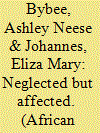

|
|
|
|
|
| Publication |
2014.
|
| Summary/Abstract |
The 'resource curse' is the paradoxical theory frequently used to explain how a seemingly desirable asset, such as oil, can actually pervert an economy, erode governance, perpetuate conflict, and ruin local communities to the extent that it becomes a curse. New oil discoveries in western Ghana and western Uganda have raised concerns for the democratic prospects and future stability of these countries and their surrounding regions. Based on field interviews in these oil-producing regions, this report summarises how local communities have been affected thus far and their concerns for the future. The authors assess the extent to which each country is vulnerable to oil-induced instability, and identify groups or communities that would be most likely to perpetuate it. Lastly, it provides some assessment of the future trajectory of each country.
|
|
|
|
|
|
|
|
|
|
|
|
|
|
|
|
| 7 |
ID:
131092


|
|
|
|
|
| Publication |
2014.
|
| Summary/Abstract |
The drivers of HIV/AIDS in the South African Police Service (SAPS) and impact of the disease on this workforce are neglected areas of research. Existing evidence suggests that while the occupational risk for contracting HIV is low, there are factors associated with the profession that, if left unmanaged, place police officers at risk of contracting HIV. This study's two aims are to identify the potential pathways of HIV infection within policing services and determine the probable impact of HIV/AIDS on SAPS. Through a systematic literature review on HIV/AIDS within police services, and by analysing selected SAPS human resource data, the causal pathways and impact of HIV/AIDS on police services are explored. The study finds that police officers (particularly male officers) are likely to be highly susceptible to HIV infection as a result of risky sexual behaviours born out of occupational characteristics such as high levels of stress, difficult working conditions, living away from home and interactions with sex workers. The problem is exacerbated by the 'macho' culture that often prevails among police officers. HIV/AIDS interventions within SAPS must focus on sustained behaviour change. Further, HIV programmes must equip officers with the knowledge and awareness to avoid engaging in high-risk sexual practices that may compromise their health and the effectiveness of the policing service.
|
|
|
|
|
|
|
|
|
|
|
|
|
|
|
|
| 8 |
ID:
131094
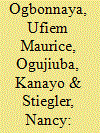

|
|
|
|
|
| Publication |
2014.
|
| Summary/Abstract |
Using the Boko Haram terrorist group in Nigeria as a point of departure, this paper examines the implications of the operations of terrorist groups on the security and stability of states in West Africa. It predominantly utilises secondary sources of data. Findings indicate that the membership and operations of this terrorist group are spreading across the sub-region. This spread is consequent upon Boko Haram's collaboration with other terrorist groups within West Africa and beyond. This constitutes threats to the security and stability of states in the sub-region. Thus, the paper recommends, among other things: a thorough understanding of the operational strategies of terrorist groups by states and those involved in security policymaking in the sub-region; and for agreements to be reached among Economic Community of West African States (ECOWAS) member states and their governments for collaboration in various areas in order to curtail transnational crime and terrorism, and reduce socio-economic inequality that generates aggressive behaviours among the less privileged.
|
|
|
|
|
|
|
|
|
|
|
|
|
|
|
|
| 9 |
ID:
131099


|
|
|
|
|
| Publication |
2014.
|
| Summary/Abstract |
While popular narratives about success in South Africa focus on individual effort, accidents of birth continue to determine life prospects. Inequalities in early childhood development, health, and education narrow the range of possibilities that young people have available to them, and this impacts on their risk appetite, including, through the workings of the maturing brain, a propensity to violence, substance abuse, and unsafe sex. New technology offers young people an unprecedented ability to organise and network. This fact, combined with high levels of youth dissatisfaction, unemployment, and marginalisation, leads many to worry that the young are "ticking time bombs". While there certainly are risks, great unused pools of youth labour also present an opportunity for engaging them in social advancement programmes. Structured youth service is a tried and tested policy option that, when implemented as part of an integrated youth development strategy, can enlist thousands of young people in devoting their considerable energies to leadership for the public good.
|
|
|
|
|
|
|
|
|
|
|
|
|
|
|
|
|
|
|
|
|